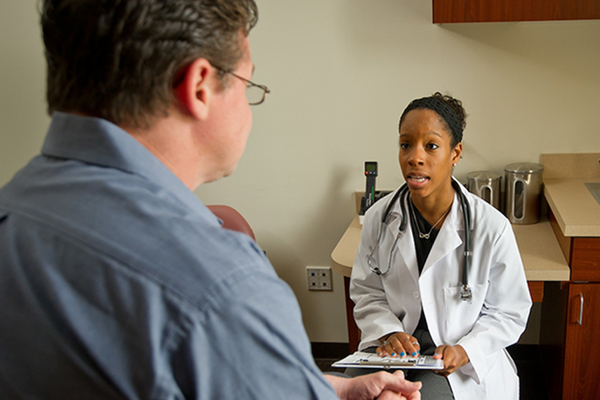
A new Notre Dame research program looks for solutions to the problem of medical nonadherence
As part of the launch of a new research program in Health-Related Behavioral Sciences, the University of Notre Dame’s Advanced Diagnostics & Therapeutics initiative has made its first award to support an investigation of why patients with Type 2 diabetes don’t always follow their prescribed medical regimens.

The study, led by Guangjian Zhang, Associate Professor of Psychology, will collect pilot data on adherence to recommendations from physicians—regarding medication, diet, physical activities, sleep, and self-administered blood tests—in forty Type 2 diabetes patients and develop statistical methods to analyze the intensive longitudinal data that are produced.
“Our long term goal is to contribute to the understanding, prevention, and treatment of lifestyle-related chronic diseases,” said Zhang, “and diabetes is an important place to start.”
The World Health Organization estimates that there are 422 million people in the world living with diabetes, and work by other researchers suggest that only 7.3% of diabetes patients fully meet all three goals of controlling blood sugar, blood pressure, and blood lipid levels.
“We think one contributing factor for patient nonadherence is the lack of effective self-management components in most diabetes treatment plans,” Zhang continued.
The study will involve both patients and spouses who are recruited through the project’s clinical partner, the Tianjin Metabolic Diseases Treatment and Prevention Center in Tianjin, China. In addition to the standard diabetes treatment plan, participants will complete questionnaires measuring such factors as demographic and personality characteristics, attachment styles, and stress. In addition, a smartphone app will be installed on patients’ and spouses’ phones that will record physiological measures of fasting blood glucose, physical activity, weight, and sleep. All of this data will be added to self-reported information on diet, the social support patients feel they receive, and other parameters.
“The involvement of spouses in the study is crucial,” added Zhang. “Although partner support is often associated with positive results toward achieving personal goals, there are also cases where it has been shown to undermine motivation.”
The Health-Related Behavioral Sciences effort is the latest addition to the Advanced Diagnostics & Therapeutics portfolio of interdisciplinary biomedical research programs, which include targeted drug delivery, imaging, and Precision Medicine.
“Until now, we’ve been known mostly for our molecular research,” explained Paul Bohn, Schmitt Professor of Chemical and Biomolecular Engineering and Director of AD&T. “But from the beginning, our clinical partners—physicians and health systems alike—have expressed their desire to tackle the behavioral aspects of healthcare as well, particularly the degree to which patients do or don’t follow their medical recommendations.”
“Often, this lack of compliance, whether it’s not eating properly, not taking a medicine, not showing up for a physical therapy session, or other examples, can have a big impact on health outcomes. These behaviors also play a significant role in driving up the cost of health delivery.”
“For all of these reasons,” Bohn said, “we’re excited to see what Prof. Zhang and his collaborators find in this first project of its kind for us.”
For more information, contact Guangjian Zhang at gzhang3@nd.edu or 574-631-3751.
The University of Notre Dame is a private research and teaching university inspired by its Catholic mission. Notre Dame faculty, students, and staff engage in research, scholarship, education, and creative endeavor in order to advance human understanding and do good in the world.
Originally published by at advanceddiagnostics.nd.edu on November 17, 2016.